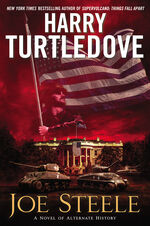TR (Message Wall | contribs) No edit summary Tag: sourceedit |
GusF (Message Wall | contribs) Tag: sourceedit |
||
| Line 31: | Line 31: | ||
Steele did little campaigning beyond assuring the American people that he would lead the country to victory over the [[Axis]] during [[World War II (Joe Steele)|World War II]]. The war ended the next year with the costly invasion of [[Japan (Joe Steele)|Japan]]. |
Steele did little campaigning beyond assuring the American people that he would lead the country to victory over the [[Axis]] during [[World War II (Joe Steele)|World War II]]. The war ended the next year with the costly invasion of [[Japan (Joe Steele)|Japan]]. |
||
| − | At home, Steele maintained his strong hold over the country. While his bid for a fourth term was |
+ | At home, Steele maintained his strong hold over the country. While his bid for a fourth term was unprecedented, it was not against the letter of [[United States Constitution]] or any law. Neither, strictly speaking, was the fact that he ran unopposed. The fact that he'd eliminated his opposition through a variety of questionable means ensured that the population was cowed. |
==The Election== |
==The Election== |
||
Revision as of 11:38, 26 March 2015
| |||||||||||||||||||||
| |||||||||||||||||||||
| |||||||||||||||||||||
The United States presidential election of 1944 was the first election since 1820 that saw the incumbent president run unopposed. Unlike 1820, 1944 was not part of an "era of good feelings", but rather the final admission that the tyrannical policies of Joe Steele had triumphed.
The Candidates
Joe Steele, his absolute power certain, made a bid for a fourth term with John Nance Garner becoming his running mate again.
The Campaign
Steele did little campaigning beyond assuring the American people that he would lead the country to victory over the Axis during World War II. The war ended the next year with the costly invasion of Japan.
At home, Steele maintained his strong hold over the country. While his bid for a fourth term was unprecedented, it was not against the letter of United States Constitution or any law. Neither, strictly speaking, was the fact that he ran unopposed. The fact that he'd eliminated his opposition through a variety of questionable means ensured that the population was cowed.
The Election
Steele won the election unanimously, carrying all 48 states and all 531 electoral votes.
OTL Campaign
Like Steele, incumbent Franklin D. Roosevelt sought an unprecendented fourth term. He was joined by Harry Truman as Vice Presidential candidate. Thomas Dewey emerged as the Republican Party's nominee from a crowded field that also included John Bricker, who would become his running mate; General Douglas MacArthur; Senator Robert Taft; the previous Republican candidate, Wendell Willkie; and Harold Stassen, who launched his first presidential campaign this year; he would launch his final one in 1992, and he never did secure the Republian nomination.
The campaign was surprisingly vicious considering the unity which had been demonstrated across the political spectrum during World War II. Dewey-Bricker campaigned against the New Deal and called for economic deregulation as the war ended. They also accused Roosevelt of ties to both corrupt urban political machines (an accusation that was not entirely baseless) and communism, and accused Roosevelt's administration of rampant corruption. Roosevelt, seeking to dispel rumors of failing health, campaigned publicly and vigorously, and openly mocked Republican criticism.
Despite Roosevelt's popularity, which was continually being buoyed by news of major battlefield victories such as Leyte Gulf, Dewey came closest of any of Roosevelt's four opponents to defeating him. However, Roosevelt died on April 12, 1945 and Truman ended up serving the rest of Roosevelt's term. Roosevelt did not live to see the end of the war.
See Also
| |||||||||||||||||||
| |||||||||||||


